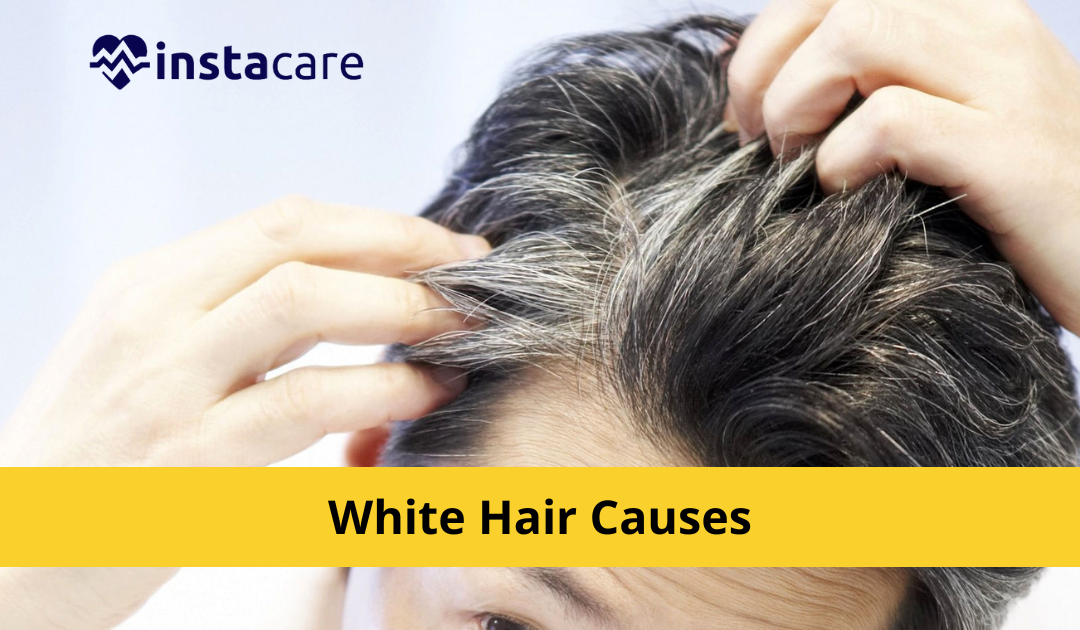It is typical for your hair to change as you get older. Perhaps you once had a full head of brown, black, red, or blonde hair. As you age, you may notice thinning in some parts of your head, or your hair may turn grey or white from its original hue. Hair follicles are tiny sacs that line skin cells in your body. Melanin-producing cells are found in hair follicles. However, hair follicles can lose colour over time, resulting in white hair.
What Causes White Hair At Early Age?
White hair stands out more in persons with darker hair. Although white hair is associated with ageing, colourless hair strands can emerge at any age, including when in high school or college. If you're a teenage person or in your twenties, you may see one or more strands of white hair.
There may be techniques to restore pigmentation, depending on the reason. Here are some of the most prevalent reasons for premature white hair.
Anxiety
Everyone experiences stress from time to time. There are the following outcomes of long time stress
- sleep issues
- stress
- a shift in appetite
- elevated blood pressure
Stress may also harm your hair. So, if you've seen an increase in white strands, stress might be to blame.
Genetics
When (or if) you get your makeup heavily influences white hair. If you notice greying or white hair at an early age, your parents or grandparents likely noticed as well. Genetics cannot be altered. However, if you don't like how your grey hair appears, you can always dye it.
View More: What Causes White Hair At Early Age
Thyroid Disease
Premature white hair may also be caused by hormonal changes induced by a thyroid condition, such as hyperthyroidism or hypothyroidism. The thyroid gland is known as a butterfly-shaped gland on the base of your neck. It aids in the regulation of various body systems, including metabolism. The colour of your hair may also be affected by your thyroid condition. If your thyroid is overactive or underactive, your body may produce less melanin.
How To Prevent White Hair From Spreading
The ability to reverse or prevent your white hair depends on the underlying reason. You can do nothing to avoid or permanently reverse the colour change if the reason is hereditary. If you suspect a medical concern, see a doctor check if an underlying illness causes white hair. Pigmentation may reappear if the underlying health condition is treated, but there are no assurances. Here are some tips for reducing white hairs:
- UV protection for your hair
- Increase Your Vitamin B12 Intake Your hair may become white due to a vitamin B12 deficiency (5).
- Have control on the levels of thyroid
- Boost Your Antioxidant Levels
- Foods to Eat to Get rid of White Hair
- Stop smoking
- Increase your intake of vitamin B5
How To Remove White Hair Naturally
There is no permanent white hair treatment, while white hair development can be slowed or reversed in some instances with the appropriate diagnosis and treatment. A healthy diet and proper hair care might also assist. In rare cases, though, the operation is irreversible. Regular natural therapies may help slow down and potentially reverse the onset of white hair. At the same time, some home remedies can slow down hair whitening.
White Hair Home Remedies
- Consume Amla to prevent white hair.
- Rinse your hair with rice water to postpone the appearance of white hair.
- Apply Mustard Oil Twice A Week to Keep White Hair Away.
- You may also apply some onion juice to the scalp and hair to reverse white hair formation.
- Coconut oil is an excellent oil for treating white hair
Conclusion
These techniques have not been clinically tested to determine their efficacy. Many of these therapies may potentially cause allergic reactions. So, before you try home treatment to alter your hair colour, consult with your doctor first. Your doctor may be able to provide insight (depending on your present health, medicines, and other conditions) about how a home cure could affect you.
Please book an appointment with the Best Doctors For Hair Fall Treatment in Lahore, Karachi, Islamabad, and all major cities of Pakistan through InstaCare, or call our helpline at 03100002273 to find a verified doctor for your disease.











